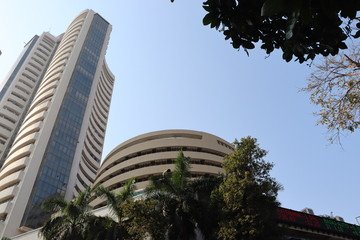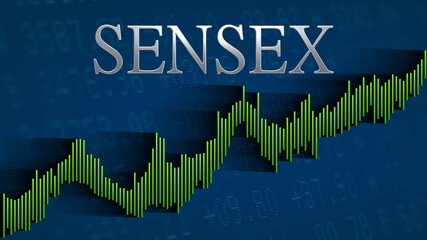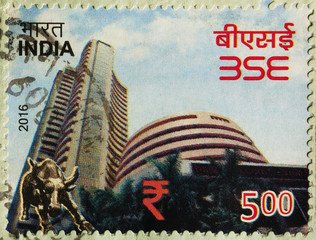What is the Bombay Stock Exchange?
Whenever we talk about nationwide stock exchanges, the names that come up are BSE and NSE. Cause both of them are considered very important. BSE, or Bombay Stock Exchange, is Asia’s oldest and India’s one of the largest stock exchanges. BSE was an integral part of the $1 trillion club and now contributes to India’s $3 trillion economy.
This exchange has an immense role in India’s capital market growth. Entire India and the world keep track of its index, Sensex. More than 6000 companies are listed on BSE, which makes it one of the biggest exchanges in the world. It is the world’s 11th largest stock exchange company in terms of market capitalization.

When Did Bombay Stock Exchange Establish?
The BSE Ltd or Bombay Stock Exchange Limited, formerly known as Native Share Stock Brokers Association, is India’s first ever stock exchange established in 1875 by Premchand Roychand. Not only that, but it also holds a unique reputation for being Asia’s very first stock exchange. It received its permanent recognition after a long time in 1956 under the Securities Contract Act 1956.
It has helped the corporate sector by providing a platform to raise capital since it was the first-ever nationwide marketplace that provided scope to buy and sell securities.
Read More: How to Invest in the US Stock Market from India
What are Securities?
Security is a negotiable financial instrument holding some kind of monetary value that the government or the company can issue. Security can be of many types, such as stocks, interest-bearing, treasury bills, bonds, mutual funds, derivatives, notes, diventures, etc. It is financial that can be traded between issuers and investors. Security grants the holder ownership of a portion of a publicly traded company listed on the stock exchange platforms. The company lists its company on any stock exchange to draw the attention of the investors to ensure liquidity. Security can be classified into 3 types: equity, derivative, and debt securites.
Securities enable capital to flow from the hand of investors to those who need it.
What Time Does The Bombay Stock Exchange Open?

Before getting into the opening and closing time of the market, you have to understand different types of markets. There is a total of three types of share market.
● Equity market
● Currency market
● Commodity market
Let us discuss further about these markets.
Equity Market
Also known as the Stock market, the equity market suggests a marketplace where people trade in company shares or ownership through an over-the-counter or exchange. Equity means the ownership of any business. If anyone buys or sells a share of any particular company, investors refer to it as equity trading in terms of investing language.
Equity Market Timing
The market opens at 9.00 AM and closes at 3.30 PM IST. However, you are allowed to trade in the market only from 9.15 AM IST. The market takes the first 15 minutes for settlement purposes. This settlement is required to calculate the previous day’s orders placed after 3.30 PM IST. These orders are known as AMO, after-market orders. You can not do any kind of trading during the settlement period.
Currency Market
Also known as Forex Market (Foreign Exchange Market) or FX, the currency market refers to the marketplace that provides scope to buy or sell national currencies. India allows forex trading among four currencies; the United States’s USD, Grate Britain’s GBP, Japan’s JPY, and Europe’s EUR. Forex trading is allowed in pairs; USD/INR, GBP/INR, JPY/INR, EUR/INR. The popular pair in the world is USD/EUR. However, in India, USD/INR is the most traded pair.
Currency Market Timing
The trading hour of the currency market is fixed. Trading is allowed for 24 hours and five days a week. These 24 hours are divided into several sessions. It remains closed on Saturday and Sunday. According to Indian timing, the market opens at 3.30 AM on Monday and closes at 2.30 AM Saturday. If you are a forex trader, you need to know about the opening and closing times of these sessions which also helps to understand market volatility and peak hours of trading.
There are a total of 4 major sessions in the currency market in terms of their volumes. The timing of different sessions is further manipulated by the seasons. During the winter session, the market always stays ahead for 1 hour as compared to the summer session. The Winter session starts in October and ends in April. The summer session starts in April and ends in October. (Below mentioned timings are as per Indian Standard Time)
The significance of the session is that Forex is the world’s biggest currency market, and traders operate from multiple locations around the world. The trading time is different for every exchange in the world. For example, the Indian currency session starts at 9 AM and closes at 5 PM.
Sydney Session
The Sydney session opens at 3.30 AM and closes at 12.30 PM.
Tokyo Session
The Tokyo session opens at 5.30 Am and closes at noon at 2.30 PM.
London Session
London session starts at 1.30 PM and closes at 10.30 PM.
New York Session
New York Session starts at 6.30 PM and closes at 2.30 AM.
Interesting Read: STOCK MARKET TERMINOLOGY FOR BEGINNERS
Commodity Market
BSE entered the commodity market about 3 years ago. It started with non-Agri commodity derivatives, followed by Agri commodities. The word “commodity” implies goods produced by nature and not by humans. The commodity market is of two types; non-agriculture commodities such as gold, silver, zinc, etc., and agriculture commodities such as wheat.
Commodity Market Timing
Commodity Market used to open at 10 AM IST and close at 11.30 PM IST. But SEBI has revised the timing, and the new timing is 9.00 AM IST to 11.30 PM IST. This is the only place you can trade in the nighttime till 11.30 PM IST. This market allows traders to deal in commodities like gold, silver, etc.
Bombay Stock Exchange Address
Bombay Stock Exchange is situated in the economic capital of India, Mumbai. It is located on Dalal Street in downtown Mumbai, India. Earlier, investors used to gather under the banyan tree near the town hall of Harniman Circle in the Church Gate area and trade in the shares. Later, this place became popular with the name ‘Dalal Street’.
Postal Address
Bombay Stock Exchange Building, Phiroze Jeejeebhoy Towers, Dalal Street, Kala Ghoda, Fort, Mumbai, 400001, India.
History of Bombay Stock Exchange
If you search Mumbai on Google you might have often seen pictures of a building printing numbers every second. That might be the picture of a share market building displaying different indexes and prices. This building and these numbers are the vines of the Indian economy. If we consider the Reserve Bank as the heart of India’s economy, then the Mumbai Stock Exchange pumps the blood into the heart. It is this stock exchange that has been holding the ups and downs of India’s economy for more than over 100 years.
The credit for establishing this Bombay Stock Exchange goes to four Gujrati and one Parsi share broker. Starting on the 9th of July 1875, this stock exchange is now the lifeline of crores of people. The Bombay Stock Exchange first came into existence under the name of the Native Share Stock Brokers Association. 318 people started the association for the first time under a banyan tree for 1 rupee as an entry fee. Investors used to gather under the banyan tree near the town hall of Harniman Circle in the Church Gate area and trade in the shares. Bombay Stock Exchange sensitive index or BSE Sensex became the reason for many traders to stay awake at night. This index is also known as BSE 30 or just SENSEX.
Functions of Bombay Stock Exchange
1. Bombay Stock Exchange is a linker between buyers and sellers of securities such as equity, debentures, derivatives, bonds, etc.
2. It helps companies, especially small-cap and mid-cap companies, raise funds to survive and function better in the market.
3. BSE Ltd increases liquidity for companies. In tough times companies can bring out their shares and turn them into liquid money that the company will get from investors.
4. BSE helps in capital formation.

How Does BSE Work?
BSE is the center of Mumbai’s money madness. Bombay Stock Exchange works as an intermediary between seller and buyer. BSE does not sell anything on its own; instead, it gives the platform to sell or buy. For example, if you want to buy a movie ticket, you go to the ticket counter where you, as a buyer, buy one or a few tickets, and the owner of the movie sells tickets through the counter of an XYZ cinema hall. Here, the XYZ cinema hall is not the owner of the movie. Rather the owner of the movie pays some commission to run his film in the cinema hall.
BSE is just like the cinema hall responsible for providing the platform to the customer. However, BSE itself is not the owner. It is an intermediary that has opened its various windows to help a company, government, or individual buy or sell securities. Since the BSE allows the seller to list its company on the platform and sell the product, it takes some charges in exchange for this service.
Bombay Stock Exchange allows active trading of stocks covering a total of 12 various sectors. With over 6000 companies listed on it, BSE became one of the biggest stock exchanges in the world. These companies actively bring out shares and raise funds by selling their stocks to the public, financial constituents, banks, and even to governments.
How Does BSE Make Money?
First of all, BSE is not a broker. It is a stock exchange where brokers have listed themselves. Hence BSE doesn’t make money through brokerage charges. If not, then how does BSE make money? The answer is, BSE makes money through different sources, such as
Transaction charge
Stock exchange makes money on transaction charges. BSE charges 0.00275% for both intraday transactions and delivery transactions.
IPO Listing
Whenever a company issues an IPO to raise money from the public, the company pays a certain fee to the stock exchange to list its IPOs. Several companies list their IPOs on the stock exchange throughout the year. Hence, the listing fee that the stock exchange gathers all around the year becomes a good income source.
ETF & CEMF
In addition to companies, the Bombay Stock Exchange also lists Exchange Traded Funds (ETFs) and Close Ended Mutual Funds. Stock exchange makes money from them as well.
Stock Brokers
Stock brokers need the membership of BSE before starting trading in securities. For that, they have to pay a specific fee to get the membership. This fee is also the income source of BSE.
Subsidiary
BSE earns through its subsidiaries as well. BSE has few subsidiaries. For example, BSE’s subsidiary BSE Institute Ltd provides certificates related to the stock market and financial training. They educate people by providing such courses that help investors understand the market better. Through these courses, BSE earns a good chunk of money.
CDSL is also a subsidiary of BSE. Those shares you buy for delivery are stored in the depository in electronic form. CDSL charges a specific amount of fees to store these data. CDSL charges this fee to depositary participants, i.e., the broker with whom the investor has opened a Demat account. The broker then cuts off some charges as a ‘DP charge.’
There are so many subsidiaries of BSE that help it make money.
Rules and Regulations
● Bombay Stock Exchange had its rules and regulations in place long before the actual legislations were enacted. They did so to ensure a secure and orderly growth of the securities market. Everything is highly regulated, and nothing is left free-ended.
● A corporate entity sets up BSE, with different individuals holding various posts, none of whom are brokers in the exchange itself.
Objectives of Bombay Stock Exchange
BSE provided a glassy and effective market for trading
Though BSE didn’t start working in all the areas as soon as it came into existence, it gradually made the base a trading platform for every required instrument. For example, If a person wants to buy a mutual fund, they do not need to knock on every door of an individual MF broker. Instead, BSE listed every MF fund, providing easy access to the pool of MFs for the investors. BSE gave a market space for every buyer and seller.
Now BSE has become an intermediary for debt instruments, MFs, equities, and derivatives trading.
BSE Ensured A Platform For Small-Cap And Mid-Cap Businesses
Small-cap and mid-cap businesses suggest small enterprises and medium enterprises, respectively. It was easy for big enterprises to collect capital by selling shares. However, small and mid-cap businesses struggled a lot to collect funds and run smoothly due to the lack of a required customer base. BSE came as a boon for them and provided that platform that enabled them to sell their shares to raise capital.
BSE Provided Electronically Driven Exchange
BSE enables buying or selling of securities based on short-time price movements to book more profit. You can call this Active Trading. It also safeguards market integrity which ensures equal access to the market for all and on time, fair and transparent trading practices, and also
matches with the high standard of corporate governance. All these have been possible by setting up an electronically driven exchange.
It Provides Services to Capital Market Participants
BSE not only provided a platform for trading to the market participants (seller and buyer), but it also provided a risk management facility, settlement, and clearing facility. BSE made the market data accessible for all and took the responsibility to educate the public regarding securities.
All the above-mentioned facilities are made available on one single platform.

Importance of Bombay Stock Exchange
● From 1857 to till date, in these 14 decades Bombay Stock Exchange played a significant role in the country’s development. It is the first institution in India that recognised the importance of wealth creation and supported it very actively by setting up a systematic and highly regulated platform.
● It has helped thousands of companies grow their capital and gradually climb the ladder of success.
● BSE elevated the Indian economy globally by trading at the speed of 6 microseconds per transaction, making it the fastest ever exchange in the world. This fame of the Indian economy has drawn the attention of many foreign investors to the Indian economy.
● BSE is the first institute to start equity derivatives in the country.
● It is the very first exchange in India to start Free Float Index.
● It is the first exchange of the country to provide the USD-based Sensex.
Also Read: TOP 10 STOCK MARKET BOOKS FOR BEGINNERS
● It also holds the reputation of being the first ever stock exchange that provides financial knowledge by its best players.
● BSE made the successful shift from the trading ring to electronic trading within mere 5o days, which is a big achievement.
● There is barely any company in the country that has not taken the service of BSE to increase its funds. BSE Sensex has become the benchmark index to evaluate the growth of companies in India.
● In this time, anyone can invest anywhere in the country easily. BSE app has enabled an ample amount of information to the investors that would not have been possible otherwise. For trading purposes, you can use this app.
Bombay Stock Exchange’s story has been the history of Indian capital markets. It has seen a lot of booms and busts since the day it started under a banyan tree. But for 140 years, what BSE is stood for is free markets, private initiative, and wealth creation.
FAQs
Question: Who owns BSE?
Answer: BSE Limited is a private company. Shocking, isn’t it? BSE Ltd is a registered company, and about 40% of stock brokers own this company. Banks, financial institutions, NBFCs, and mutual fund houses own a 7-8% portion. The current MD & CEO of BSE is Ashishkumar Chauhan.
Question: Does BSE listed on the stock exchange?
Answer: Yes, BSE itself is listed in the exchange.
Question: Is BSE considered the fastest stock exchange in the world?
Answer: BSE is the fastest-growing stock exchange in the world, and it is growing at the speed of 6 microseconds per transaction.
Question: How many days a week BSE stays open?
Answer: BSE stays open 5 days a week. It starts on Monday at 9 AM and closes at 3.30 PM on Friday. All the national holidays are also applicable in BSE.
Question: Is BSE safe? Who monitors its activities?
Answer: BSE is a safe exchange that has been holding its reputation of fair trade and transparency for about 143 years now. The activity of BSE is monitored and controlled by SEBI. SEBI, or Securities and Exchange Board of India, is the government body which means BSE is under the surveillance of the government to some extent that makes it even safer to trade in.
Question: Is BSE listed on the stock exchange?
Answer: Yes, BSE, as a company, lists itself on the stock exchange and steadily outperforms the sector while delivering a healthy return of 7.5%.
Question: Can anyone directly invest through BSE?
Answer: No, no one can directly buy or sell shares on the stock exchange.
Investors need to purchase shares listed on BSE from a broker.
One response to “What is the Bombay Stock Exchange?”
Leave a Reply
Recent blog
Course
- Unlocking the Mysteries of Bull Markets: A Comprehensive Guide
- Understanding Blue Chip Stocks: Definition, Examples, and Investment Strategies
- Understanding Volatility: What Is Volatility in the Stock Market?
- What is SEBI: Role, Structure, and Powers
- Understanding Bear Market: Types, Causes, and Consequences






[…] Interesting Read: What is the Bombay Stock Exchange? […]